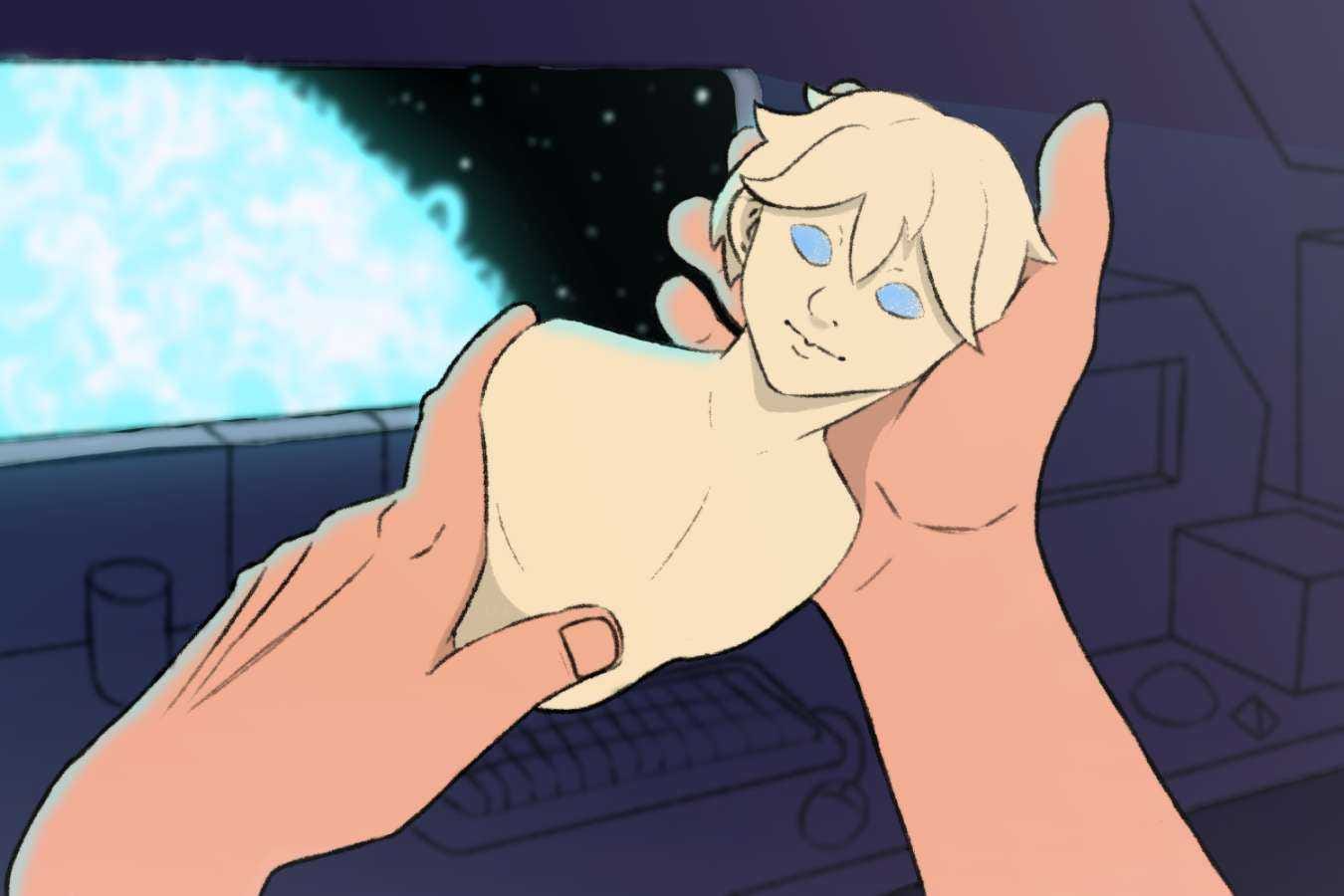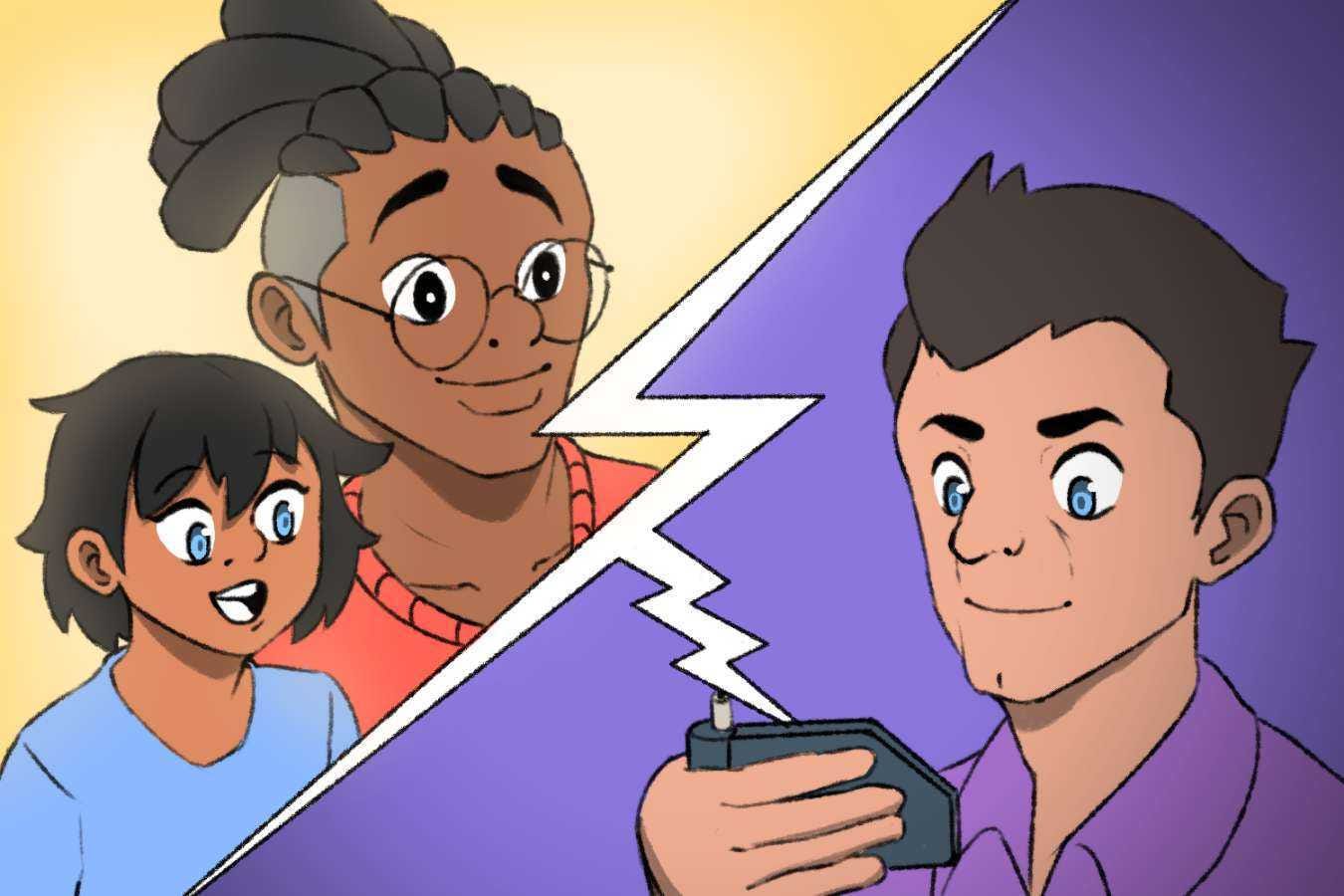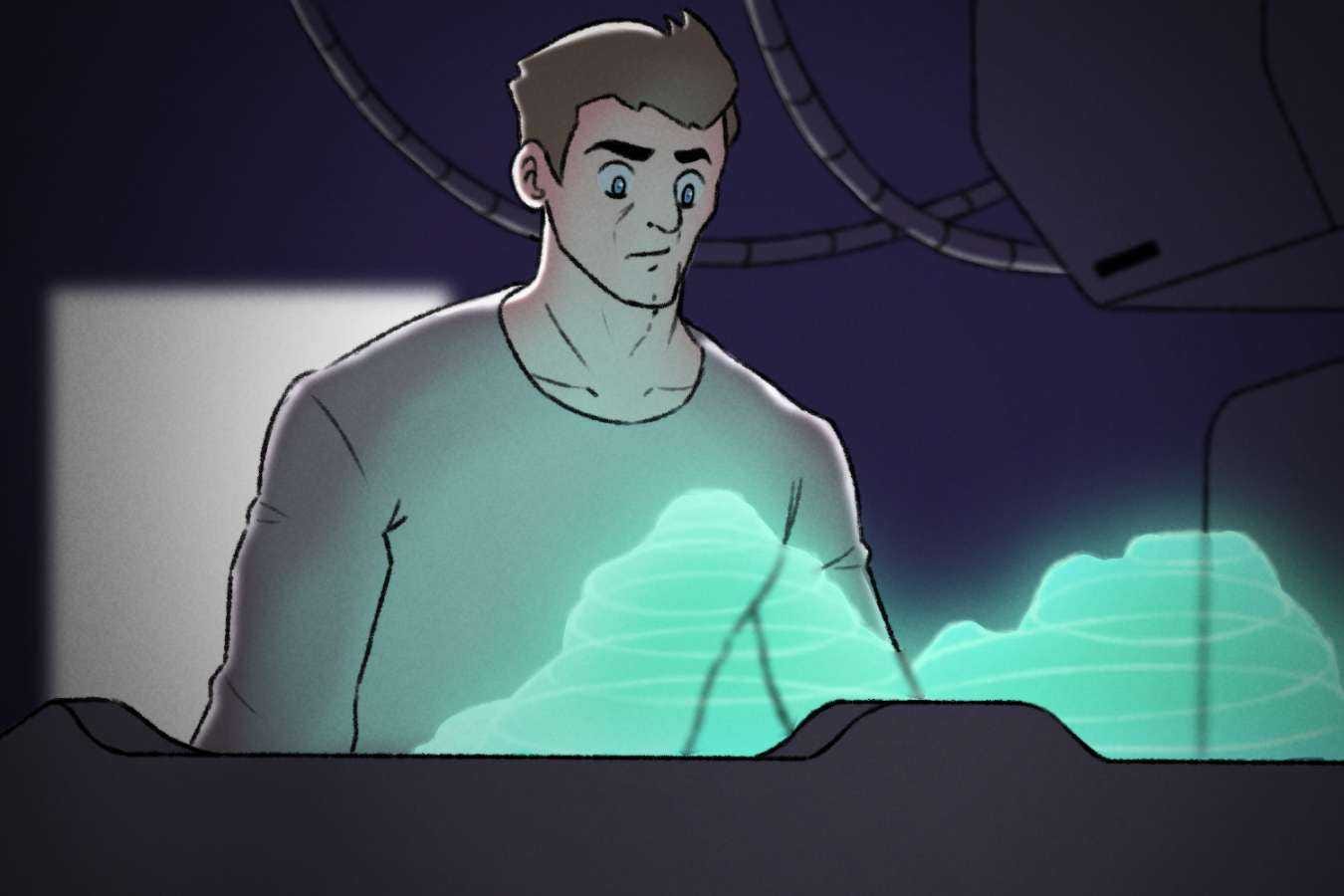Ponds
by Orion Ruffin-Green
“The Ponds in Our Eyes” by Michael Simmons
Albeit he assured Iulian that the modification was a simple one, his incredible physicist of a husband had worked it out so that they would always be in sync, so that he would never be late. And, because he was a decent father who loved speaking with his daughter, who loved to peer into that swift and silly mind of hers, he never was. He awoke a few seconds before her message arrived upon the small uplink he kept in his chest pocket, right under the rib that Nora would softly pat every time she wanted to speak to him. The uplink was a simple recording device; Nora and he would relay messages through it; a received message would galvanise a simple haptic output – for him, this was a patting sensation, the exact rhythm and similar weight of Nora’s small fingers. For Nora, it was a haptic interpretation of his whistle, one of her favourite sounds, one of the first she had ever heard. It was easy for his incredible physicist husband, Dr Casper Willof, to calculate the delay between the two; Iulian always told him where the Attas were performing their work, which was typically within a particular sector of the Beltway. Iulian did not like to stray far from home, from the two pieces of his heart.
“It’s bedtime, Baba,” began Nora’s little broadcast, sleepiness and excitement equally colouring her voice, “but I really, really, really want to tell you a story!”
“A short story,” Casper reminded her, softness belying the firmness Iulian knew shone through his thundercloud eyes.
“A short story! Okay, today, I found a fruit in the word search at school, and nobody else found it! It was... wait, per-cinnamon?”
Iulian could hear Casper biting back his laughter as he amended, “Persimmon, baby.”
“Per-cinnamon! That’s what I said, silly!”
Iulian grinned in the darkness, glee trickling down his cheeks as he listened to Casper try and reconcile what he knew to be true with what Nora believed. Iulian nodded when Casper surrendered; he’d been working on getting the physicist to prioritise Nora’s growth over her being correct, and was proud to hear Casper take a deep breath and smile, and let Nora be right.
“Baba, I love you! I’m going to dream a pretty head for my statue, so make sure you sleep so you can catch it, okay? Good
morning!”
Iulian kissed the uplink in lieu of his sweet daughter, who knew now that her Baba would receive the message upon waking up for his daily duties. He recalled when, just a few months ago, that notion had eluded her; she would wish him a good night, no
matter where he was dispatched. Iulian and Casper, asking Casper’s mother for ideas shortly thereafter, painted a diagram on Nora’s wall to help explain the situation.
“So, when Baba is on this side,” Casper explained, “he will always wake up after you. But when he’s on this side, he’ll wake up before you!”
“Baba is weird,” Nora would giggle. “How can he wake up before and after me? Will we ever wake up at the same time?”
For the sake of ease, her fathers fibbed.
“He’s just so weird!”
“I am, I am...”
The three of them giggled. They ate dinner. They cleaned their teeth. They went to sleep, a pile in the den. Nora would sleepily touch Iulian’s face as he kissed her farewell. Casper would assure Iulian that this would be the time he found that missing
piece of Nora’s little statue. Iulian would hope fervently so, related to his husband through a shy, small smile, which Casper would kiss before bidding his sweet scavenger husband farewell. Iulian, taking the lev to the station from which he and his crew of fellow Attas would depart, always shook his head at the idea that what he did was scavenging. Dismantling defunct rings throughout the Beltway was, to him, as integral a part to society as fungi to the forests his crew’s namesake used to flourish in. Carve away the decrepit to make way for the growth; such was nature. And he and his crew implemented a similar measure in space as their own species made their way throughout the solar system.
In the present, Iulian smiled. He pressed the broadcast button on his uplink and whispered to Nora about his dreams, and how full they were of her laughter and statues. Iulian recalled when the uplink was first patented, and the strife caused the inventor, Celadon Arocho. The company she had worked for at the time had tasked her with developing a means of storing information as it was collected. She had found that her colleagues – for whom the tool was crafted – benefited from having an alert once a note was saved to the department’s cloud. Not only did such an alert ensure that each employee knew when the notes were ready for listening to; they also increased the likelihood that the notes would be heard and read. The more immediate and tangible the alert, she found, the less the time between publication of the note and its examination. Having a collection of antiquated controllers and driving
simulators, leftovers from the heirlooms dispersed amongst her and her siblings, she tested various forms of feedback – visual, auditory, and haptic; she found greatest success with the last, and thus incorporated it into the tool, to which she referred as an “uplink,” as it “links us personally.”
When Arocho, feeling unappreciated at her job with the company, went to start her own, her former employer sought to claim the patent for themselves. It took much of a decade, but Arocho stood victorious after several petty and greedy but ultimately
detrimental gambits. The company she’d left was nothing but a footnote in many management students’ textbooks in the section on poor business practices. Five models into her uplink enterprises, Arocho opened up the software layout so that others could add to it as they wished. Casper seized the opportunity, purchasing both himself and Iulian a pair of discount Gemini v3 uplinks, which were specifically paired for spouses and sold at discount on a rose-coloured holiday only the businesses celebrated.
Iulian rose to his feet and stretched, prepared himself for the day. He and Saret were paired, as they were the ones most familiar with the stowing of rarities and creature comforts. They were, as decided by their foreman, the most meticulous of the crew,
meant more for the tedious jobs than the massive excisions. Truthfully, Saret and Iulian were both a bit older and more self-sufficient in their work. They were requested often by the executives who owned the companies who built the rings; Saret was masterful at stowing fabric-based works, whereas Iulian could carve an anatomically correct heart from glass. It was an administrative jest that whenever the executives decided to relocate their offices, they would send Saret and Iulian. The other Attas were sent along for fuel efficiency.
Saret greeted Iulian as he arrived at the room she’d started working.
“Still haven’t found the one that sings to you?” Saret asked, referring to the piece of Nora’s statue he sought.
Iulian shook his head.
“Maybe today, kind hunter. Maybe today.”
Iulian grinned. Saret liked to reference old films.
The two worked for hours, stowing away the items they were ordered to, taking a gander at those which weren’t on their lists. Company policy was to destroy or repurpose those items which were not requested. More often than not, specialists like Iulian and Saret would keep the refuse which would prove useful with their own passion projects. Saret had created some interesting art installations using the fabrics she recovered from executive suites; silk tents, linen life-size figurines, dresses and coats and capes and other such fashion comprised of the artwork which inspired them. Iulian had always been into sculpting, but never on a massive scale. His miniatures adorned many desks and dressers and doors throughout his neighbourhood. Whereas Saret would express something within herself, Iulian always aspired to express something within others, some trait of theirs which defined that person’s relation to him.
In some instances, this made Iulian so frustrated, though he would never admit it aloud. Though Nora was a genetic blend of him and his husband, it was always Casper to whom people instinctively likened Nora’s features. And this was accurate – Nora had Casper’s button nose, had his small and round ears, had his dark complexion and immaculate smile. If her growth spurts were any indication, she would have Casper’s height, though he was the only one in his family who retained their wiriness into adulthood. There was so much of Casper’s influence on Nora outwardly that people tended to ignore the semblances she had with Iulian. His propensity for silent grandiosity, his demure silliness, the seriousness with which he crafted his art, the intensity of his stare – her eyes. Casper had given Nora all her phenotype except for her eyes.
“Those are ours,” Iulian’s mother had rasped, holding Nora in her frail, shuddering arms. “Those are the ponds we brought from home.”
Iulian’s mother had dwelt on Earth for most of her life, in a small neighbourhood built near a lush wood. Tucked in the depths of this wood was a pond she would visit every day of her youth. Her father had carried her there shortly after she was born and
told her the story of that pond, that it had gazed into the eyes of a thousand of her ancestors, and hoped that it would gaze into the
eyes of a thousand more.
“The trees lean over to share their secrets,” he explained to her then, “and the pond stores their secrets in our eyes, so that we might see the beauty of the world everywhere.”
As she perished, quivering in the hospital she always claimed far too frigid, she whispered into Iulian’s ear with her final breaths, “I gave you the ponds, Iulian; you must give them to Nora. Promise me, you’ll keep them in our eyes, so that... when we return...”
He did. Iulian was a kind son to his mother. She died four months after Nora was born.
“Is this what Baba’s mommy had in her eyes?” Nora asked one day, flipping through one of Iulian’s books on various stones, minerals, and crystals. “Is this what makes our eyes so green, Baba?”
Iulian glanced at the page, saw that Nora was pointing to a cross-section of jade.
“It is,” he answered, placing a kiss upon Nora’s hair.
“There was none,” Iulian remarked when Saret asked him of his success. He’d joined her in the next office, where she’d waited for his assistance, needing to wind a massive and heavy scroll tightly enough to fit into its storage container.
Saret mused, “The execs always want to tie themselves to something beyond our reach, don’t they? It’s always the past, giving themselves a sense of... inevitability.”
Iulian nodded as he held the ends of the scroll together so Saret could slide the container over and seal it.
“You would think they wouldn’t abandon their own mythos so quickly to lesser hands, though.”
Iulian grinned. “They use ours to keep theirs pristine.”
“Ha! Sure, sure! They’re too feeble to heft about their own grime!”
The artisan Attas chuckled amongst themselves a moment before tuning into the broadcast sent throughout the ring, an alert to the presence of the first cargo shuttle.
Saret sucked her teeth. “Already? We’ve barely had time to clear one room...”
“The children sounded busy,” Iulian offered, remarking upon the boisterousness of the ones deconstructing rooms below the executive offices.
The two hoisted the containers they had filled to the loading bay, within which the first cargo shuttle sat. Pater and her cousin, Selenite, loudly laughed as they exited the shuttle, continuing their conversation until they saw the Attas arriving with their
small loads.
“Delicates?” Selenite inquired, nodding at the pair.
“Premium ones,” answered Saret, earning a sardonic whistle of admiration from Pater.
“They always keep the best for themselves, ah?” she observed with a wink. “Closest to us; we’ll keep the big stuff in the back.”
“Hi, Iulian,” greeted Selenite as she offered to take his box.
“Did Lorelei like her shell replica?” he asked her, watching as she slapped on the magnetic tape which would keep the box from shifting too much during transport.
Selenite beamed as she twirled, emphatically relaying the immense mirth with which Lorelei was filled upon receipt of the gift Iulian had made for her birthday. Selenite had mentioned her daughter only twice to the sculptor, but the sheer volume of
information Iulian had gleaned from those fleeting dialogues had filled him with such inspiration that he stayed up one night, weaving together a shell from the memory of his parents’ family photograph albums and the broken sandstone replica of an exec’s
fourth ex-spouse.
The rest of the Attas started arriving with their loads of various cubed metals, stacked screens, and other miscellaneous office supplies which had been mounted and left in the way of the crew. Saret and Iulian took their presence as an indication to return
to their tasks, and so they started making their way around the halls to where they had been storing the scrolls. It was as they were passing a hall that Iulian saw it, the glittering wall. At first, he continued on his path, the transfixion not settling in, but a song snared his feet, bound him to the spot, reversed his gaze and gait and set him towards the glittering wall, a strange vision on an otherwise tepid ring.
At first, Iulian couldn’t understand what he was seeing, having no framework for such a scene embedded in his memory. As its commissioner had, Iulian found himself drawn the centre of both the room and the wall. The art before him was divided in twain, parallel to its bewildered viewer. The immense adornment matched the length of the table which rose from the floor behind Iulian as his body temperature registered on the sensors surrounding him; fourteen could comfortably sit at this table with no threat of touching elbows. From behind Iulian erupted a circular light, hurling a silhouette of his head and shoulders onto the image with little effect on the art as a whole. Its massivity impressed Iulian; it was, however, the detail which captivated him, which bound him to the spot, his unknowingly ravenous eyes devouring the subtle variations in depth throughout. Iulian recognised, having seen similar instances in the books his parents had inherited from theirs, as well as within the projections used in the geography classes he took before he moved to the planet’s surface, this to be a meticulous rendering of an elevation map, but he could not place the location it detailed.
“She has one built in every office she inhabits,” Saret explained to the mystified Iulian. He jumped, having been so captivated by the art that he had missed her entrance. She grinned, watching him recover; she continued, “It’s the only reason she never puts it on the list. A piece of her ancestral home. She’ll have this one burned before installing the new one, a perpetuation of her family emblem.”
“Where was she from?”
Saret, who was leaning on the bare wall behind Iulian, pointed her lips towards podiums clustered in the corner opposite herself. “Same as the stone used to make those unlisted items, I imagine.”
Iulian stepped aside of the projection and blinked a couple of times, clearing his the light from his eyes and, upon recognition of the particular stone capping the otherwise metal and silicone stand, filling them with mirthful tears.
Ponds is a work of optimistic, realistic, scientific fiction by Orion Ruffin-Green.
Illustrations for this work were created by Michael Simmons.
Thank you for reading Possbilia Magazine, and watch next week for the nonfiction companion piece that accompanies Ponds.
We welcome you to subscribe for access to additional art, interviews with our contributors, and more behind-the-scenes content!






